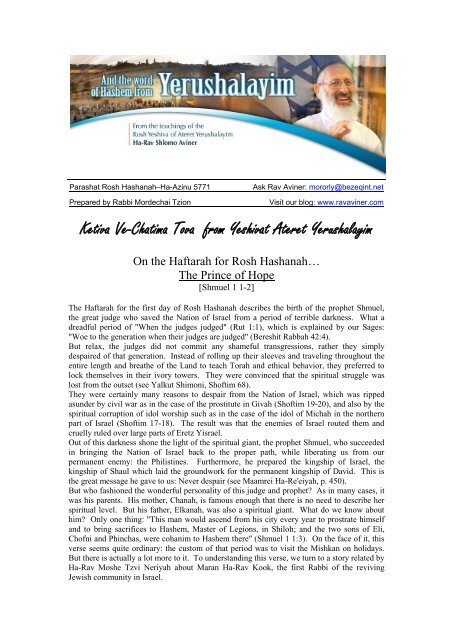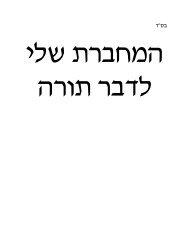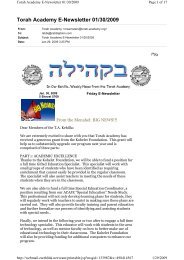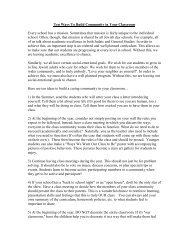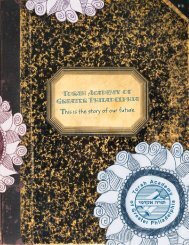Ketiva Ve-Chatima Tova from Yeshivat Ateret Yerushalayim
Ketiva Ve-Chatima Tova from Yeshivat Ateret Yerushalayim
Ketiva Ve-Chatima Tova from Yeshivat Ateret Yerushalayim
Create successful ePaper yourself
Turn your PDF publications into a flip-book with our unique Google optimized e-Paper software.
Parashat Rosh Hashanah–Ha-Azinu 5771<br />
Ask Rav Aviner: mororly@bezeqint.net<br />
Prepared by Rabbi Mordechai Tzion<br />
Visit our blog: www.ravaviner.com<br />
<strong>Ketiva</strong> <strong>Ve</strong>-<strong>Chatima</strong> <strong>Tova</strong> <strong>from</strong> <strong>Yeshivat</strong> <strong>Ateret</strong> <strong>Yerushalayim</strong><br />
On the Haftarah for Rosh Hashanah…<br />
The Prince of Hope<br />
[Shmuel 1 1-2]<br />
The Haftarah for the first day of Rosh Hashanah describes the birth of the prophet Shmuel,<br />
the great judge who saved the Nation of Israel <strong>from</strong> a period of terrible darkness. What a<br />
dreadful period of "When the judges judged" (Rut 1:1), which is explained by our Sages:<br />
"Woe to the generation when their judges are judged" (Bereshit Rabbah 42:4).<br />
But relax, the judges did not commit any shameful transgressions, rather they simply<br />
despaired of that generation. Instead of rolling up their sleeves and traveling throughout the<br />
entire length and breathe of the Land to teach Torah and ethical behavior, they preferred to<br />
lock themselves in their ivory towers. They were convinced that the spiritual struggle was<br />
lost <strong>from</strong> the outset (see Yalkut Shimoni, Shoftim 68).<br />
They were certainly many reasons to despair <strong>from</strong> the Nation of Israel, which was ripped<br />
asunder by civil war as in the case of the prostitute in Givah (Shoftim 19-20), and also by the<br />
spiritual corruption of idol worship such as in the case of the idol of Michah in the northern<br />
part of Israel (Shoftim 17-18). The result was that the enemies of Israel routed them and<br />
cruelly ruled over large parts of Eretz Yisrael.<br />
Out of this darkness shone the light of the spiritual giant, the prophet Shmuel, who succeeded<br />
in bringing the Nation of Israel back to the proper path, while liberating us <strong>from</strong> our<br />
permanent enemy: the Philistines. Furthermore, he prepared the kingship of Israel, the<br />
kingship of Shaul which laid the groundwork for the permanent kingship of David. This is<br />
the great message he gave to us: Never despair (see Maamrei Ha-Re'eiyah, p. 450).<br />
But who fashioned the wonderful personality of this judge and prophet? As in many cases, it<br />
was his parents. His mother, Chanah, is famous enough that there is no need to describe her<br />
spiritual level. But his father, Elkanah, was also a spiritual giant. What do we know about<br />
him? Only one thing: "This man would ascend <strong>from</strong> his city every year to prostrate himself<br />
and to bring sacrifices to Hashem, Master of Legions, in Shiloh; and the two sons of Eli,<br />
Chofni and Phinchas, were cohanim to Hashem there" (Shmuel 1 1:3). On the face of it, this<br />
verse seems quite ordinary: the custom of that period was to visit the Mishkan on holidays.<br />
But there is actually a lot more to it. To understanding this verse, we turn to a story related by<br />
Ha-Rav Moshe Tzvi Neriyah about Maran Ha-Rav Kook, the first Rabbi of the reviving<br />
Jewish community in Israel.
A Torah scholar who made aliyah <strong>from</strong> America came to Maran Ha-Rav Kook and<br />
complained about the state of Judaism in the Land of Israel. He was so distressed that he was<br />
considering leaving Israel. Maran Ha-Rav Kook said to him: Doesn't your honor remember<br />
the learning of his youth? The Book of Shmuel relates about Elkanah: "This man would<br />
ascend <strong>from</strong> his city every year to prostrate himself and to bring sacrifices to Hashem, Master<br />
of Legions, in Shiloh; and the two sons of Eli, Chofni and Phinchas, were cohanim to Hashem<br />
there." Rav Kook asked two questions about this verse: 1. Why are we told in this verse that<br />
Chofni and Phinchas were there? 2. Our Sages say that Elkanah would not only go up to<br />
Shiloh, he would go around and encourage others to do so as well. Why did he have to do<br />
this? After all, isn’t ascending to the Mishkan on the holidays a Torah mitzvah? Why weren't<br />
people following this mitzvah? Rav Kook explains that the first question is in fact the answer<br />
to the second question. The fact that Chofni and Phinchas were the cohanim in Shiloh caused<br />
people not to make the pilgrimage there, because Eli’s sons were corrupt. People said that if<br />
there were cohanim like this in this holy place, it was better not to go and see this ugliness<br />
and meet such sinners. Elkanah then came and convinced them that despite the sons of Eli<br />
and despite the sins at this holy place, they should not give up on this mitzvah of Hashem.<br />
They should strengthen this holy place. Right now there are not great people there, but later<br />
there will be. Do not give up because of the difficulties. As a reward for this act, Elkanah<br />
was blessed with a son, the prophet Shmuel, who served in the Mishkan. Rav Kook said to<br />
the Torah scholar that the same applies in relation to the holiness of the Land of Israel. Why<br />
are you angry with the Land of Israel? There are problems, therefore exert yourself and<br />
everything will work out. Although there are sinners, this is not a reason not to make aliyah<br />
and, all the more so, not to leave the Land of Israel. The more people committed to the Torah<br />
and mitzvot in the Land of Israel, the more holiness will be added to it (Chayei Ha-Re'eiyah<br />
pp. 211-212).<br />
This story <strong>from</strong> Maran Ha-Rav Kook's life provides us with deep understanding and an<br />
important contemporary lesson. The Nation sometimes loses its path, but we are told to act<br />
like Elkanah, who guided the Nation to follow him to the Mishkan on the holidays<br />
(Yerushalami Berachot at the end of chap. 9). But, make no mistake about it, Elkanah did not<br />
spend time giving speeches on proper behavior. In his commentary on the Jerusalem Talmud,<br />
Rabbi Eliezer Azkari, who was one of the leading sages in Tzefat during its golden period,<br />
explained that Elkanah had an influence on those of his generation mainly by his example: he<br />
would go up to Shiloh with such excitement, cleaving to Hashem and joy that it awakened a<br />
desire among others to join him. He loved the Nation of Israel, and respected it despite what<br />
he saw, and he was therefore successful in sharing his unshakeable faith with them. In the<br />
end, he merited a son who followed his path: he brought the Nation of Israel <strong>from</strong> darkness to<br />
great light.<br />
Rav Aviner on…<br />
The Prohibition Against Murdering Gentiles<br />
[Be-Ahavah U-Be-Emunah – Netzavim <strong>Ve</strong>yelech 5770 – translated by R. Blumberg]<br />
(Published ten years ago, leaflet number #175, but, unfortunately, still needs to be published<br />
today).<br />
(In answer to the question of whether or not it is permitted to murder non-Jews): I was caused<br />
great sorrow and shame by your very question of whether or not it is permissible to murder a<br />
non-Jew. The very fact of posing such a disreputable question is a mark of spiritual weakness<br />
and loss of direction. From four perspectives, each sufficient in and of itself, we can<br />
understand it is a severe, absolute prohibition.<br />
1. From the perspective of faith in G-d, murdering an Arab, as if to advance the renaissance of<br />
our Nation in its Land, constitutes lack of faith in G-d. We believe that G-d is returning His<br />
Divine Presence to Zion and restoring Israel to its Land, accompanied by ups and downs, light
and darkness. With all of the problems and difficulties, we do not struggle out of despair, but<br />
as warriors certain of victory. We therefore are not dragged down into wild, corrupt deeds.<br />
Rather, our fight over our Land must always be full of caution and integrity. We must not lose<br />
our heads. We must be aware that this is not what G-d demands of us, but rather that we be<br />
partners in the rebuilding of our Land.<br />
2. From the moral perspective, harming one’s fellow man is immoral, let alone murdering<br />
him. One’s absolute duty to avoid such acts is part of the universal morality that encompasses<br />
every person on earth. This morality was not nullified for Jews by the Sinai Revelation. Quite<br />
the contrary, the Torah places us on a higher moral plane than any nation on earth. As the<br />
Mechilta teaches, “Prior to the Sinai Revelation, we were admonished against bloodshed.<br />
Following the Sinai Revelation, when our laws became more severe, could the laws of<br />
bloodshed have become more lenient?” (Quoted in Kesef Mishnah on Rambam, Hilchot<br />
Rotzeach U-Shemirat Ha-Nefesh 2:11).<br />
3. From the legal perspective, the Talmud and our legal decisors state explicitly the<br />
prohibition against shedding the non-Jew’s blood (Sanhedrin 57a and Rambam ibid.). This<br />
prohibition is <strong>from</strong> the Torah (Bet Meir, Even Ha-Ezer 17:3). As for the question of why the<br />
punishment to the person who murders the non-Jew is “given over to Heaven” -- to the<br />
Heavenly tribunal – rather than to an earthly tribunal (Rambam ibid.), Rabbi Meir Simcha of<br />
Dvinsk explains, in his second interpretation, that this is because besides the sin of murder<br />
involved, there is also the severe sin of Chilul Hashem, the desecration of G-d’s name, for<br />
which there is no repentance. Neither Yom Kippur nor suffering atone for this sin, but only<br />
death. Therefore, execution by a human tribunal would not atone for his sin of murder<br />
(Meshech Chochmah, Shemot 21:14).<br />
I do not believe that there is a Rabbi who has permitted the murder of Arabs. Perhaps he<br />
expressed such an idea as figurative hyperbole, but even by doing so he violated the dictum of<br />
“Sages, be cautious in your words” (Avot 1:11). If, however, it should become clear, G-d<br />
forbid, that a Rabbi gave a practical ruling to do such a thing, it would become retroactively<br />
clear that that Rabbi, with all of his importance, is unworthy of the title "Moreh Hora’ah,"<br />
“Teacher of the Law.” As a rule, one must be aware that regarding such grave questions, not<br />
every Rabbi is entitled to render decisions, but only the great luminaries who lead our<br />
generation.<br />
4. From the perspective of pure nationalism, partisan murder of a non-Jew brings harm to our<br />
country. In the early days before the establishment of our state, various Jewish undergrounds<br />
carried out sentence against non-Jews in accordance with the reality of those times, yet our<br />
own times are not like those were. Now we have an army and a police force who risk their<br />
lives day and night for the nation’s security, and it is they, and no one else, who are appointed<br />
by the whole Nation to punish the enemies of our people. No private individual is entitled to<br />
engage in anti-Arab terrorism, to weaken the government and to perform, in the name of the<br />
Nation, any acts as a result of which the whole Nation will suffer.<br />
Let us rid ourselves of the desecration of G-d’s name inherent in such painful, insulting<br />
questions. Let us devote our educational efforts to explaining that this shameful path stands in<br />
opposition to the essence of the Jewish Torah and its morality, and further causes real harm to<br />
the Nation and State of Israel. We must fortify ourselves with patience, and we must remain<br />
aware that salvation comes gradually. Let us become stronger to overcome our difficulties. If<br />
we proceed with wisdom and understanding then in the end we will emerge victorious.<br />
Kitzur Tefilat Amecha - #9<br />
[adapted for middle-schoolers by Rabbi Shmuel Jablon <strong>from</strong> Rav Aviner's threevolume<br />
commentary on the siddur "Tefilat Amecha"]<br />
In Birkot Ha-Shachar we bless Hashem "who has provided me with all my needs." This<br />
blessing speaks about the individual. But what if I, or some other individual, don’t have all<br />
our needs? What if we are poor, or sick, or depressed or struggling in some other way? This
lessing reminds us that Hashem has made His world in such a way that everyone CAN have<br />
everything they need. He has made the world perfectly. But it is up to people to make sure<br />
that everyone has their individual needs meet. So the world has enough food. The world has<br />
enough caring people and friends. We have to make sure that everyone we meet feels cared<br />
about. Hashem has done His part, and we thank Him for it. Now we have to do our part.<br />
Selichot/Vidui<br />
When we say the Vidui - the confessions - we verbally confess ours sins. This is part of our<br />
taking responsibility for our actions. We list sins in Alef-Bet order. Many have the custom to<br />
confess even more sins for each letter.<br />
Notice, though, that we say these sins in the plural. "WE sinned. WE rebelled. WE stole..."<br />
This is because all Jews are responsible for one another. We are as one body, so the sins of<br />
one impacts us all. Therefore, we are confessing not only our sins, but the sins of all of the<br />
Nation of Israel.<br />
Finally, it is interesting to note that we confess sins against other people, as well those against<br />
Hashem. Sometimes they are the same sin. For example, we say "Bagadnu- We rebelled."<br />
This means we rebelled against Hashem. He has done so much for us yet we didn't repay Him<br />
properly. But it also means we rebelled against other people, too. People did good things for<br />
us and we didn't treat them properly. We say "Gazalnu- We stole." It means that we stole<br />
<strong>from</strong> Hashem. We didn't say blessings. Or we didn't use the talents He gave us properly. But<br />
it also means that we stole <strong>from</strong> others- their money, their time, or their feelings.<br />
Text Message Responsa<br />
Ha-Rav answers hundreds of text message questions a week. Some appear in the<br />
parashah sheets "Ma'ayanei Ha-Yeshu'ah" and "Olam Ha-Katan." Here's a sample:<br />
Selling Alcohol<br />
Q: Is it permissible for me to sell alcohol to Arabs, since it is forbidden for them to drink it<br />
according to their religion (Islam)?<br />
A: It is permissible, since it is permissible according to the Seven Mitzvot of Bnei Noach.<br />
There is therefore no problem of placing a stumbling block before the blind.<br />
Passion in Serving of Hashem<br />
Q: I generally have passion in serving Hashem. What do I do when I do not?<br />
A: It is a test <strong>from</strong> Hashem to serve Him for the sake of serving Him. See Musar Avicha of<br />
Maran Ha-Rav Kook.<br />
Immersing a Pot<br />
Q: I bought a pot produced by non-Jews but had to screw on the handle. Does it require<br />
immersion in a Mikveh?<br />
A: No, this is considered assembly by a Jew.<br />
Earthquake Insurance<br />
Q: Is purchasing earthquake insurance for a building a lack of faith in Hashem?<br />
A: No, it is acting properly. See Igrot Moshe (Orach Chaim 2:111). Yechaveh Da'at (3:85).<br />
Maaser<br />
Q: I found money. Do I have to give Maaser?
A: Yes, as on all money.<br />
Circus<br />
Q: Is it permissible to go to the circus?<br />
A: No. It is "Moshav Leitzim" (frivolity) and immodest (Avodah Zarah 18b).<br />
Education<br />
Q: My daughter does not want to get up for davening on Shabbat morning but wants to sleep<br />
until lunch. Should I wake her?<br />
A: You will not solve it by force.<br />
Tzitzit<br />
Q: The law is that only a four-cornered garment requires Tzitzit. Why then do we especially<br />
wear Tzitzit?<br />
A: They are the uniform of the Nation of Israel.<br />
Hidur Mitzvah<br />
Q: Is it preferable to buy a higher-quality Four Species or buy a regular set and give the<br />
additional money to Tzedakah?<br />
A: Give the money to tzedakah. It is of greater importance (Ha-Rav Avraham Shapira in<br />
Rosh Devarcha, p. 194).<br />
Milchig and Flieshchig Garbage Cans<br />
Q: Is it permissible to throw milchig and fleishchig leftovers in the same garbage can or does<br />
one need separate ones?<br />
A: It is forbidden to throw them in if they are boiling hot since it would be considered<br />
cooking meat and milk together (Chullin 115b. See, however, Mi-Penini Ha-Rav p. 152).<br />
Temple Mount<br />
Q: Should one tear his clothing when seeing the spot where the Temple stood?<br />
A: No, since it is under our sovereignty (Tal Chermon – Moadim, p. 218).<br />
"Price Tag"<br />
Q: Should we punish Arabs for the trouble the Army does to the Settlers?<br />
A: It is forbidden to punish an Arab for a transgression he did not commit. Furthermore,<br />
punishment must be meted out by the Nation and not an individual. It is therefore forbidden,<br />
and also causes damage.<br />
Special thank you to Fred Casden for editing the <strong>Ateret</strong> <strong>Yerushalayim</strong> Parshah Sheet


